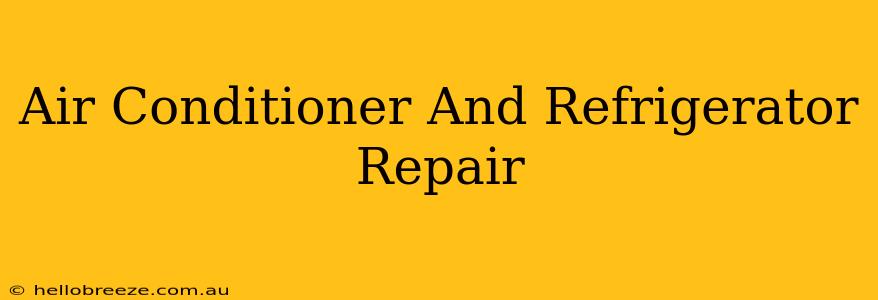Summer's heat and the need for fresh food can quickly turn into a major problem when your air conditioner or refrigerator decides to take a break. Facing a malfunctioning AC unit on a sweltering day or discovering your refrigerator is on the fritz can be incredibly stressful. This guide covers common issues, troubleshooting tips, and when to call in a professional for air conditioner and refrigerator repair.
Understanding Common Air Conditioner Problems
Air conditioners, while essential, are complex machines. Knowing the common issues can help you identify problems early and potentially save you money.
Frequent AC Problems:
-
Lack of Cold Air: This could indicate a refrigerant leak, a problem with the compressor, or a clogged air filter. Regular filter changes are crucial for preventative maintenance.
-
Strange Noises: Clicking, banging, or grinding sounds usually point to a mechanical problem within the unit. Ignoring these noises can lead to more significant and costly damage down the line.
-
Leaking Water: Water leaks are often caused by a clogged condensate drain line or a frozen evaporator coil.
-
Unit Not Turning On: This could range from a blown fuse or tripped breaker to more serious electrical issues. Always check your breaker box first.
-
Inconsistent Cooling: Inconsistent cooling might be due to insufficient refrigerant, airflow problems, or a failing compressor.
Troubleshooting Your Refrigerator
Refrigerators, responsible for preserving our food, also require attention. Knowing the common issues can help you avoid spoilage and costly repairs.
Common Refrigerator Problems:
-
Food Spoilage: This is often a sign of a failing compressor, thermostat issues, or a faulty door seal. Check your door seals regularly for proper sealing.
-
Excessive Frost Build-up: Excessive frost usually indicates a problem with the defrost system or a faulty defrost heater.
-
Temperature Fluctuations: Inconsistent temperatures can result from a malfunctioning thermostat or a problem with the cooling system.
-
Loud Noises: Grinding, humming, or rattling noises suggest a potential mechanical issue that requires professional attention.
-
Water Leaks: Leaks can signify a problem with the water supply line, ice maker, or drain system.
When to Call a Professional for Air Conditioner and Refrigerator Repair
While some minor issues can be tackled with DIY solutions (like cleaning a filter), it's crucial to know when to call a qualified technician. Don't attempt repairs beyond your skill level. Attempting complex repairs can void warranties and potentially cause further damage.
Here are some instances where professional help is necessary:
-
Refrigerant Leaks: Refrigerant is a specialized substance that requires proper handling by licensed technicians.
-
Electrical Issues: Working with electrical components can be dangerous. Always prioritize safety and call a professional for electrical problems.
-
Compressor Problems: Compressors are the heart of both appliances; their repair or replacement often requires specialized knowledge and tools.
Preventative Maintenance: The Key to Longevity
Regular maintenance is key to extending the lifespan of your air conditioner and refrigerator and preventing costly repairs.
-
Clean or replace air conditioner filters monthly.
-
Check refrigerator door seals for proper sealing.
-
Inspect for leaks and unusual noises regularly.
-
Schedule annual professional maintenance checks.
By understanding common problems, performing basic troubleshooting, and knowing when to seek professional help for your air conditioner and refrigerator repair, you can keep your home cool and your food fresh for years to come. Remember, preventative maintenance is the best way to avoid costly repairs and ensure the longevity of these vital appliances.

